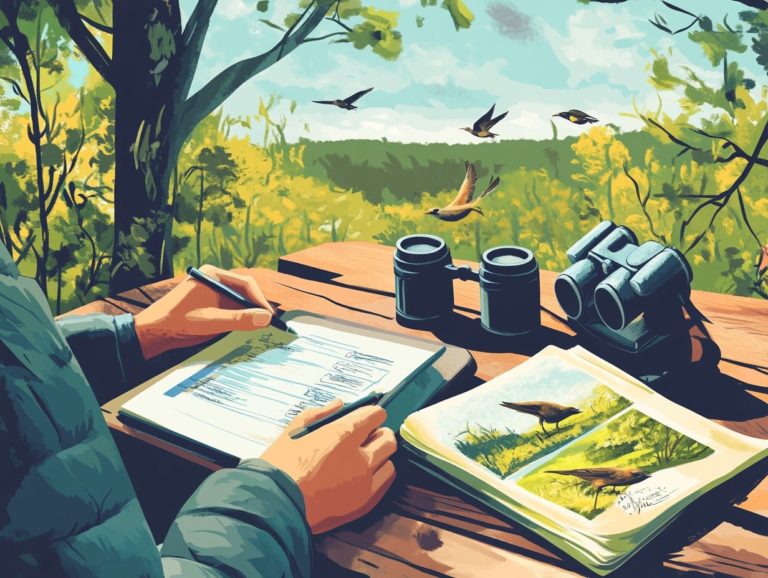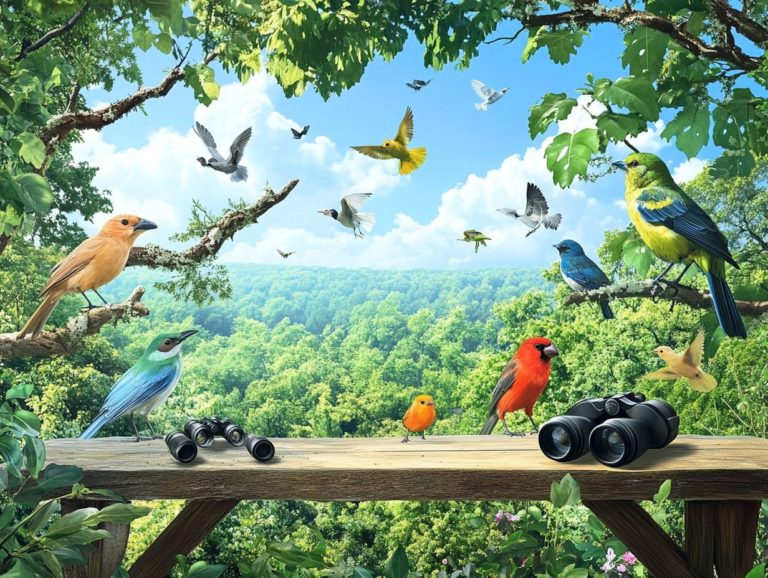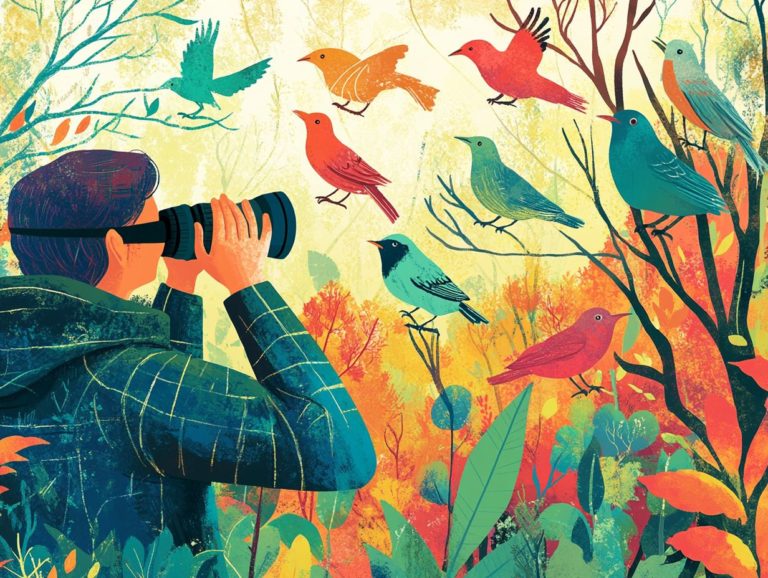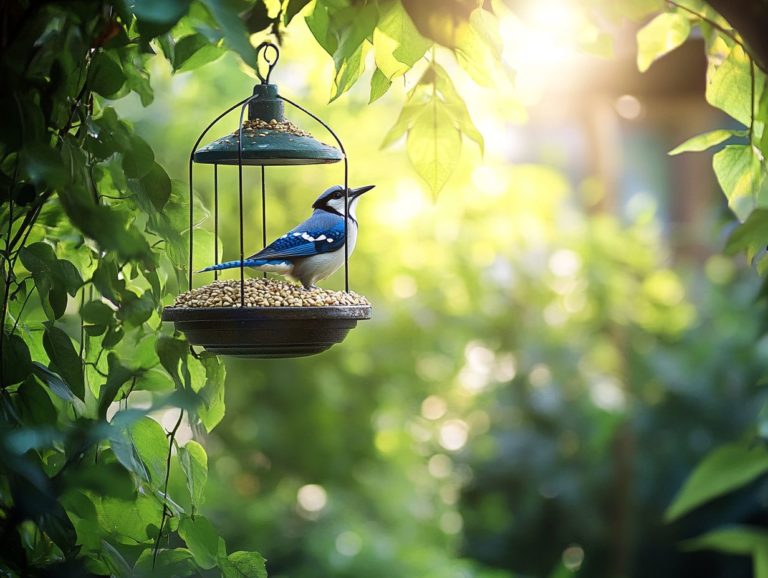6 Ways to Improve Your Bird Watching Patience
Bird watching is as much about the journey as it is about the destination. While the excitement of spotting a rare bird can be exhilarating, the waiting game can challenge even the most seasoned observers.
This article explores six effective strategies to enhance your patience in bird watching, ranging from mindfulness techniques to finding joy in the wait.
We will also discuss why patience is essential in this serene pursuit and how cultivating it can benefit other aspects of your life. Get ready to transform your birding experience!
Contents
- Key Takeaways:
- 1. Learn to Appreciate the Wait
- 2. Practice Mindfulness Techniques
- 3. Set Realistic Expectations
- 4. The Joy of Reading During Birdwatching
- 5. Find Your Birdwatching Tribe!
- 6. Use Binoculars and Other Equipment
- Why Is Patience Important in Bird Watching?
- What Are the Benefits of Being Patient in Bird Watching?
- How Can Bird Watching Improve One’s Patience in Other Areas of Life?
- What Are Some Common Challenges That Test Patience in Bird Watching?
- How Can One Overcome Impatience in Bird Watching?
- What Are Some Tips for Staying Patient While Waiting for Birds to Appear?
- Frequently Asked Questions
- What does it mean to have patience while bird watching?
- Why is patience crucial in bird watching?
- How can I increase my bird watching patience?
- What is mindfulness and how can it enhance bird watching patience?
- How do realistic expectations help improve my bird watching patience?
- Why is being prepared important for bird watching patience?
Key Takeaways:
- Embrace the wait; find joy in stillness.
- Stay mindful and calm while observing nature.
- Set achievable goals; not every outing means lots of sightings!
1. Learn to Appreciate the Wait
Appreciating the wait is a vital aspect of bird watching that enhances the overall experience and deepens our connection with nature. Urban wetlands, such as those in Central London, attract a variety of bird species, including kingfishers and Canada geese.
Learning to embrace the wait allows us to immerse ourselves in their world, even amid the bustling city. This practice not only improves mental health by offering a momentary escape from daily stresses but also fosters a state of awareness. Bird watchers often share incredible stories that arise from extended periods of stillness.
One enthusiast recounts the overwhelming joy of spotting a rare migratory bird after a long wait, emphasizing how the anticipation magnified that happiness. Spending time outdoors while appreciating the wait has been shown to improve mood and reduce anxiety, serving as a natural form of therapy.
Effective ways to appreciate the wait include:
- Setting a timer to observe something for five minutes.
- Practicing mindfulness by taking deep breaths and listening to the sounds of nature.
To appreciate the wait is to truly value the world around us in a more profound way.
2. Practice Mindfulness Techniques
Mindfulness techniques employed during bird watching can significantly enhance the outdoor experience, fostering a deeper connection to nature and an increased appreciation for the subtle wonders of the natural world, from the vibrant colors of a kingfisher to the graceful flight of a heron.
Practicing mindfulness means being fully present and focused on the moment. In the context of bird watching, this means immersing oneself in the environment and attuning to the rhythmic chirps and the rustling leaves, which provide a meditative backdrop for reflection.
Simple techniques, such as paying attention to one’s breathing and observing the surroundings without judgment, promote calmness and clarity. Many members of the birding community report that taking a moment to appreciate the beauty around them has sharpened their observational skills while also reducing anxiety and elevating their mood.
Sharing these moments of heightened awareness often strengthens community bonds among enthusiasts, enriching the enjoyment of nature for both individuals and the collective group.
3. Set Realistic Expectations
Setting realistic expectations in bird watching is essential for having a good experience, especially in urban wetlands where the presence of birds like cormorants and goldeneyes can evoke excitement but may also involve considerable waiting.
By recognizing that not every bird watching outing will result in numerous sightings, enthusiasts can embrace the unpredictability of natural environments, fostering a sense of patience and appreciation for nature’s small wonders. This shift transforms the experience from merely ticking off a checklist of seen birds to a meditative practice in itself.
Members of the bird watching community often share stories of their tranquil days, punctuated only by the rustling of leaves, which are cherished for the time they provide for contemplation.
When planning a bird watching trip, it’s exciting to balance big goals with smaller ones, like observing and enjoying more common birds. This approach allows individuals to celebrate small victories, such as catching a fleeting glimpse of a heron, and to find joy in unexpected encounters.
4. The Joy of Reading During Birdwatching
Having a good book or music on hand while birdwatching can enhance the experience. It provides something engaging to enjoy while waiting to spot a rare bird in the serene natural settings of Central London’s wetlands.
Reading or listening to music can help you appreciate nature more deeply. This practice promotes mindfulness, allowing you to step away from the daily rush and notice the finer details of your surroundings.
When selecting a book, choose poetry or nature writing that inspires contemplation and creativity. These genres foster a greater understanding of the natural world, including birds. Music creates a soothing auditory backdrop, with soft instrumental tunes or natural sounds being the most suitable choices.
Audiobooks and playlists that can be easily activated during quiet moments are ideal. They seamlessly blend into the experience without becoming a distraction.
5. Find Your Birdwatching Tribe!
Join a birdwatching group to elevate your experience! You’ll meet people who share your passion and learn from each other while exploring urban wetlands and local parks worldwide.
Participants benefit from the collective wisdom of members with varying levels of experience. This is especially valuable for both novices and seasoned birders.
Organizations such as Madison Audubon and the Feminist Bird Club foster communities within the birding world. They provide mentorship opportunities that help develop skills.
The groups host regular outings, workshops, and social events. These experiences are both educational and enjoyable.
To find a local birdwatching group, conduct online research for nearby chapters or social media communities. Attend a few events to discover the group that best fits your needs.
6. Use Binoculars and Other Equipment
Using binoculars and other essential equipment significantly enhances the birding experience. They aid in identification and allow exploration of diverse ecosystems found in urban wetlands, like those in Central London.
Selecting the right binoculars is crucial, as various types cater to different environments and purposes. For instance, compact binoculars work well for hiking, while larger, more powerful ones excel in backyard birdwatching.
Choose binoculars based on magnification and field of view. This is important for spotting birds in different environments. Gadgets such as field guides and smartphone apps are invaluable for spotting and identifying different species.
Popular brands like Nikon and Zeiss are renowned for their optical clarity. The Vortex Diamondback is a highly regarded model known for its durability and performance across various conditions.
Why Is Patience Important in Bird Watching?
Patience is a crucial aspect of birdwatching, allowing enthusiasts to fully immerse themselves in their surroundings. This increases the likelihood of rewarding bird sightings, whether it’s waiting to see a peregrine falcon soar overhead or observing the subtle interactions of local bird species in urban wetlands.
These experiences enhance the joy of birding and foster a sense of calm and mindfulness, which can positively impact mental health.
Many birdwatchers share stories of extraordinary encounters, such as witnessing the flash of a blue kingfisher diving for fish after spending long periods in quiet observation. One birdwatcher recounted an experience where, after sitting silently for half an hour, he was rewarded with the sight of a beautiful woodpecker drumming on a tree in the distance.
These stories highlight that patience in birdwatching creates a calm mindset, allowing you to fully enjoy the experience.
What Are the Benefits of Being Patient in Bird Watching?
The advantages of practicing patience in birdwatching include improved mental health, enhanced nature therapy, and a greater appreciation for biodiversity and the natural beauty around us. This practice fosters peace of mind and emotional resilience, helping individuals cope with everyday stress more effectively. It clearly demonstrates the birding benefits of patience.
Birders often say that the thrill of waiting in silence for a rare bird is one of the most exhilarating parts of birdwatching! This stillness creates a connection to the natural world, with many describing each outing as a meditative experience.
The act of waiting builds excitement and understanding while enhancing appreciation for the fleeting beauty of nature. This ultimately deepens enjoyment and fulfillment in the great outdoors.
How Can Bird Watching Improve One’s Patience in Other Areas of Life?
Bird watching helps you be patient by building mental strength and a deeper connection with nature, which are essential aspects of mindfulness practices—methods that help you stay present and aware. This mindfulness tends to extend into daily life, enhancing overall well-being.
By observing the slow, deliberate movements of birds, bird watchers become more attuned to their surroundings. This skill translates into everyday experiences. For example, someone who regularly engages in bird watching may find they are better equipped to manage stress in demanding work situations or navigate challenging conversations with loved ones.
People who coach patients often find they are more comfortable with the ups and downs of relationships. They develop a heightened awareness of the importance of waiting for the right moment to express themselves. They also cultivate patience towards their own self-improvement, understanding that personal growth takes time and effort; it does not happen overnight.
What Are Some Common Challenges That Test Patience in Bird Watching?
Birdwatching presents several common challenges that test one’s patience, like unpredictable weather, elusive bird species, and variability in bird sightings. These factors require birding enthusiasts to adapt and maintain a positive mindset during their outdoor adventures.
Frustration can arise, especially when birdwatchers invest significant time trying to locate a particular species, only to leave empty-handed. Environmental changes, such as increased human activity and habitat destruction, can complicate the search for birds.
To navigate these challenges, it is essential to remain flexible. Birdwatchers may consider adjusting the timing of their trips to early mornings or late afternoons, or exploring new locations.
One of the greatest advantages of the birding community is that sharing experiences can provide insights not found in field guides. By connecting with fellow birdwatchers, individuals can learn how to adapt and gain valuable lessons from each outing.
How Can One Overcome Impatience in Bird Watching?
To overcome impatience in bird watching, consider incorporating mindfulness practices like breathing exercises, setting realistic goals, and engaging with a supportive birding community that fosters shared knowledge and patience.
Simple yet effective breathing exercises can help bird enthusiasts maintain focus during the quiet moments spent waiting for birds. By setting achievable goals, bird watching can feel less overwhelming and more rewarding.
Researching new bird species builds excitement and turns the waiting period into a valuable learning experience. Discovering the unique traits and behaviors of different species enriches the time spent in anticipation.
Connecting with a birding community provides encouragement, tips, and shared experiences. This transforms the solitary nature of bird watching into a communal activity that nurtures patience. Sharing the waiting time with others not only enhances the experience but also turns it into a collective learning opportunity.
Join a local birdwatching group today and experience the joy of waiting for that elusive bird!
Don’t miss out on the experience of a lifetime—start birdwatching today!
What Are Some Tips for Staying Patient While Waiting for Birds to Appear?
Simple activities can help you stay patient while waiting for birds. Techniques like mindfulness and engaging with your surroundings can make the wait more enjoyable.
By using these effective strategies, even idle waiting can become fulfilling. Mindfulness can be as simple as listening to the wind through the trees or the distant chirps of other creatures.
Observing your surroundings can spark motivation. The vibrant flowers and sunlight filtering through the leaves remind you of nature’s beauty.
Activities like sketching or journaling can divert your mind and fuel creativity. This turns your wait into a time for artistic expression and reflection.
Frequently Asked Questions
What does it mean to have patience while bird watching?
Patience in bird watching means waiting to observe birds without frustration. It’s about enjoying the moment and the experience.
Why is patience crucial in bird watching?
Patience is key because it helps you appreciate and observe birds without disrupting their behavior. It allows you to enjoy the process fully.
How can I increase my bird watching patience?
You can improve your patience by practicing mindfulness, setting realistic expectations, being prepared, and learning from experienced bird watchers.
What is mindfulness and how can it enhance bird watching patience?
Mindfulness means being present in the moment. It helps you focus on what you observe, reducing distractions and enhancing your enjoyment.
How do realistic expectations help improve my bird watching patience?
Having realistic expectations means understanding that you may not see every bird you hope for. This mindset keeps you calm even if sightings are fewer than you hoped.
Why is being prepared important for bird watching patience?
Being ready with the right gear makes bird watching smoother. With the right tools, you’ll enjoy the experience more and be inclined to stay patient.




